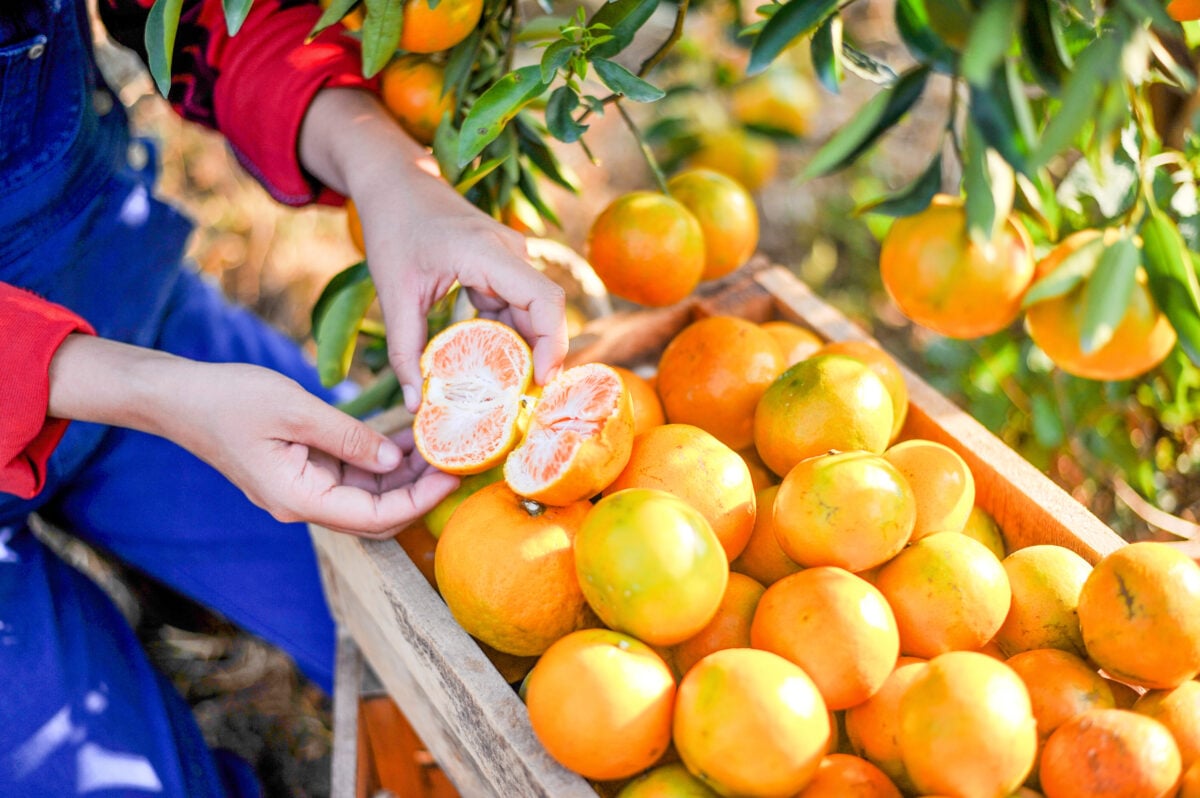Juice manufacturers are searching for a possible alternative fruit to oranges due to crop shortages and record high prices for concentrate.
Read more: Climate Crisis Makes UK’s Heavy Rain And Storms 10 Times More Likely, Study Finds
Brazil’s orange-growing regions, which produce approximately 70 percent of the global supply, are currently experiencing high rates of “citrus greening,” an incurable bacterial infection. The increase in disease and an overall reduction in yield are thought to be caused by the extreme heat and devastating droughts Brazil experienced last year.
Droughts, intense heat, and other extreme weather events – including heavy rain and floods – are all symptoms of the worsening climate crisis, which is devastating crops worldwide.
Previous shortfall predictions included a 15 percent drop in Brazil’s orange harvest for 2024 compared to last year, but updated estimates suggest a 24 percent reduction in output. Earlier this week, concentrated orange juice futures reached USD $4.92 a pound at New York’s Intercontinental Exchange, nearly twice the price reported a year ago.
In response to potential shortages and price hikes, manufacturers are exploring whether they could incorporate mandarin oranges alongside typical juicing varieties to ease the pressure.
Florida, the second biggest producer globally and the US’s main orange-growing region, has also experienced climate-related industry setbacks in recent years.
A series of hurricanes, an unexpected cold snap, and an outbreak of citrus greening significantly reduced the state’s orange-growing capacity. The USDA forecast Florida’s total orange production for 2023–24 at just over 845,000 tons, its second-lowest harvest in nearly 90 years.
Read more: Avocado Production Set For Heavy Decline Due To Climate Crisis, Report Finds
Brazil’s orange harvest worse than previously predicted

Typically, the industry has been able to wait out crop failures and extreme weather by incorporating frozen orange juice, which has a shelf life of around two years. However, several consecutive poor harvests and continuing extreme weather mean this may not be enough.
Kees Cools, president of the International Fruit and Vegetable Juice Association (IFU), told the Financial Times that the industry is facing a “crisis.” Cools added, “We’ve never seen anything like it, even during the big freezes and big hurricanes.”
If the industry does want to include other citrus fruits in its orange juice production, the IFU will need to lobby the UN to rewrite some of its regulations around ingredients. This would also require National legislative changes.
Producers have considered fruits such as mangos, apples, and grapes, but since mandarins have a similar flavor to typical juicing oranges – and are relatively hardy when it comes to the changing climate – they could make an ideal addition.
In Japan, 7-Eleven owner Seven & I Holdings Co has already incorporated domestically grown mandarins into a new blended orange and mandarin juice product.
Read more: Hundreds Of Climate Scientists Predict Global Heating Of At Least 2.5C
Shift towards plant-based food is ‘essential’ for a sustainable food system
In May, experts warned of high prices and food shortages in the UK due to simultaneous extreme weather events nationwide and throughout Europe. The climate crisis is worsening, and both national and international measures to mitigate it are suboptimal, at best.
A landmark court case in Switzerland recently ruled that the government’s inaction on climate change breached its citizens’ human rights. Meanwhile, London’s High Court found the UK’s new climate action plan unlawful due to a lack of evidence for its attainability.
Last year, scientists warned that simultaneous harvest failures pose a significant threat to global food security. Furthermore, they suggest that these threats are currently underestimated. In 2021, NASA predicted the global impact of climate change on crops by the end of the decade.
Studies have repeatedly reported that transitioning away from high-impact foods like meat and dairy – and towards plant-based alternatives – is one of the most effective ways to ensure a sustainable and equitable food system. In January, Adhanom Ghebreyesus, the World Health Organization’s Director-General, called this shift “essential.”






